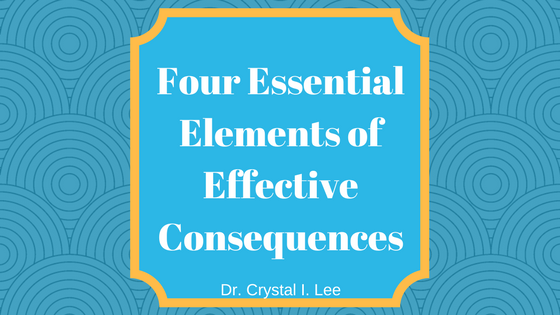Parents often ask me how to effectively create consequences for their teen or emerging adult child. In some ways, it’s the same as when you crafted consequences for your young child, but there are two really important differences. I thought about all the elements I’ve spoken to parents about over the years and created a list of the four essential considerations when creating effective consequences.
Don’t Rush It
It’s tempting to give a consequence right away without giving it thought. This often leads to consequences that don’t really teach your child what you’re hoping they’ll learn. Resist the temptation to immediately tell your child a consequence and take a moment to really think about what you’d like him to learn and then create a natural consequence that will help teach him that lesson.
Follow Through
This might sound a little obvious, but you have to follow-through with your consequences. This also means you have to pick a consequence you can realistically follow-through with. If you know that you can’t possibly actually monitor what time your child comes home, then that’s an ineffective thing to latch your consequence on to. You want to choose something you’re comfortable following-through with and will follow-through with. If your child sees the lack of follow-through, she’ll start pushing boundaries to see which consequences are actual consequences and which boundaries are just fluff.
Separate from Your Child’s Behavior
Easier said than done, right? Try to remember that, as much as you want to teach your child something, it’s their choice to change their behavior or not. Sometimes you have to separate yourself from your child’s behavior or else, when they don’t change, you’ll get more frustrated and either escalate the situation or give up completely. Creating a little distance (and remembering that your job is to try to teach them and, ultimately, you can’t control their behavior) will go a long way in keeping your sanity.
Give Consequences Neutrally
This goes along with the above point. If you’re able to separate from your child’s behavior, it’ll be much easier to be very neutral when giving consequences. Bringing negativity or hostility to a situation will only escalate it further, and your child will only hear your tone of voice instead of the words you’re speaking. Make it easier for them to really hear you by speaking in a neutral tone of voice, without any heightened emotion.
All of the above points might seem so simple, but, in the heat of the moment, it can be pretty difficult to always implement these points. Think of these as new habits that you need to practice and give yourself time to make the changes. As always, just try your best and the rest will come.
If you feel like you need more support in your parenting journey, send us a message or book a free 20 minute consultation call with Dr. Barajas or Dr. Goldman to see how she can help.
Please read more about parenting an emerging adult here.




